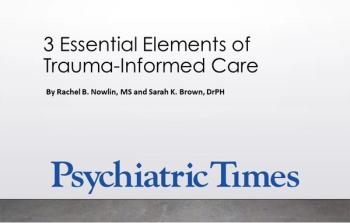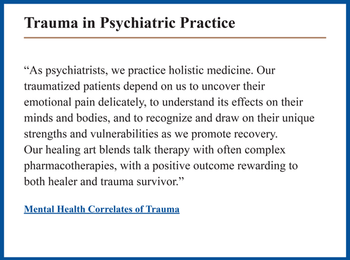
Patients want to pass on many things to their children; trauma is not one of them.

Patients want to pass on many things to their children; trauma is not one of them.

Times are hard but they are easier if we get through them together. Omar Reda, MD, provides activities and insight on ways to actively care for yourself and your family.

We have learned that in order to provide much-needed social support during difficult times, organizations should prepare to take certain steps.

While recovering from trauma, survivors have a chance to find a voice, meaning, and even beauty.

Patients with serious mental illness such as schizophrenia are more likely to report greater impairment in general functioning as a result of trauma, which is why trauma-informed care is so important.

Infectious outbreaks have shaped the psyche of humanity for times immemorial.

The recognition of a wide range of traumatic experiences-physical or sexual assault, motor vehicular accidents, natural disasters, terrorism-has implications for understanding the vulnerability to vicarious trauma inherent in a clinician’s practice.

Successful, trauma-informed care for patients with serious mental illness requires providers to assess, acknowledge, and treat trauma.

The privacy and security of our offices-the therapeutic bunkers within which our wounded patient-warriors hunker down against an unseen enemy-is the fundamental first barricade between private sufferings and the potential for public humiliation.

As psychiatrists, we practice holistic medicine. Our traumatized patients depend on us to uncover their emotional pain delicately, to understand its effects on their minds and bodies, and to recognize and draw on their unique strengths and vulnerabilities as we promote recovery.

Traumatic brain injury, criminal responsibility, traumatic stress, and autism spectrum/neurodevelopmental disorders slideshow

The first half of the 20th century saw 2 world wars, indiscriminate aerial bombing of civilians, the dropping of the atomic bomb, and the Holocaust-all of which created intense trauma for soldiers and civilians.Yet it was not until the American intervention in a post-colonial civil war in Southeast Asia that the psychiatric community in the 1970s formally described what we now call PTSD.

In preparing DSM-IV, we worked hard to avoid causing confusion in forensic settings. Realizing that lawyers read documents in their own special way, we had a panel of forensic psychiatrists go over every word to reduce the risks that DSM IV could be misused in the courts.

When counseling trauma victims and patients with PTSD, do you ask them to retell the trauma or do you think this prolongs it?

Colonel David M. Benedek, MD-a psychiatrist-takes a brief look at the emotional fallout of war in veterans returning from Iraq and Afghanistan and points you to the "The Clinical Manual for Management of PTSD."

David Osser, MD, and his colleagues from Harvard Medical School summarize key aspects of the Psychopharmacology Algorithm for PTSD.

The New York Times of February 14 carries the disturbing news of an alarming increase in deaths from accidental overdose among our active duty military personnel and our war veterans.

In this blog, Dr Pols reviews The Politics of War Trauma: The Aftermath of World War II in Eleven European Countries, by Jolande Withuis and Annet Mooij (eds).

Which treatment was found to be detrimental to patients with PTSD? What is the Brøset Violence Checklist used for? These questions and more in this week's quiz.

Results from a study published in the Journal of Psychopharmacology suggest that MDMA combined with psychotherapy may be a safe and effective treatment for symptoms of post-traumatic stress disorder.

Any effort to develop a diagnostic manual for world-wide use must grapple with the question of cross-cultural applicability. The description and diagnostic criteria for schizophrenia must work as well in East Timor as in the US or France. In this piece I choose PTSD to show the complexity of the cultural issue for DSM-5.

Mental health organizations have reacted strongly to recent statements by BP that reimbursement of stress-related claims caused by the oil spill is improbable. In fact BP has said that none of the $20 billion escrow fund will be distributed to mental health needs.

The latest information released by the US Army reveals that last year American soldiers attempted suicide at the rate of about 5 /day. There were 160 successful suicides last year and during June the rate was 1/day. Military research has reported that one in 10 Iraq veterans may develop a severe case of PTSD.

In continuing efforts to help the overwhelming number of soldiers returning from Iraq and Afghanistan with PTSD, the US Army is using therapy dogs.

The effects of the BP oil spill are sure to reach beyond the environment. Psychiatrists warned that the spill may have long-term psychological consequences on residents, mental health workers, and cleanup volunteers.